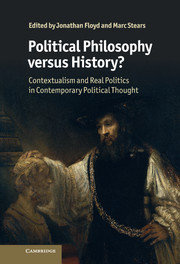 Political Philosophy versus History?
Political Philosophy versus History? Book contents
- Frontmatter
- Contents
- Note on the contributors
- Acknowledgements
- Introduction
- Part I The challenge of contextualism
- 1 Rescuing political theory from the tyranny of history
- 2 From historical contextualism, to mentalism, to behaviourism
- 3 Contingency and judgement in history of political philosophy: a phenomenological approach
- 4 Political philosophy and the dead hand of its history
- Part II The challenge of realism
- Index
- References
1 - Rescuing political theory from the tyranny of history
from Part I - The challenge of contextualism
Published online by Cambridge University Press: 05 June 2012
- Frontmatter
- Contents
- Note on the contributors
- Acknowledgements
- Introduction
- Part I The challenge of contextualism
- 1 Rescuing political theory from the tyranny of history
- 2 From historical contextualism, to mentalism, to behaviourism
- 3 Contingency and judgement in history of political philosophy: a phenomenological approach
- 4 Political philosophy and the dead hand of its history
- Part II The challenge of realism
- Index
- References
Summary
. . . the only way to make discernible progress in political philosophy is by studying history, social and economic institutions and the real world of politics in a reflective way. This is not incompatible with “doing philosophy”; rather, in this area, it is the only sensible way to proceed. After all, a major danger in using highly abstractive methods in political philosophy is that one will succeed in merely generalising one’s own local prejudices and repackaging them as demands of reason. The study of history can help us to counteract this natural human bias.
Raymond Geuss’s warning against excessive abstraction in political philosophy is well taken and familiar. Similarly, the claim that attention to history is also important for progress in political theory and philosophy is also eminently sensible (as far as it goes), and unlikely to be denied by any but the most uncompromising of rationalists: the late Robert Nozick and more recently the late Gerry Cohen might perhaps come to mind. Most contemporary political philosophers acknowledge the importance of history and contingent circumstances in thinking about politics and moral life. What is at issue is how far we should push this acknowledgement of the claims of history for any viable political philosophy. This is the issue I wish to address in this chapter. For despite the superficial good sense of Geuss’s claims in the opening epigraph, he goes on in most of his work to make a much stronger assault on the possibility of a political philosophy that does not give pride of place to history, and he uses an appeal to history to support his scepticism about the claims of reason in political theory.
- Type
- Chapter
- Information
- Political Philosophy versus History?Contextualism and Real Politics in Contemporary Political Thought, pp. 13 - 37Publisher: Cambridge University PressPrint publication year: 2011
References
- 13
- Cited by
